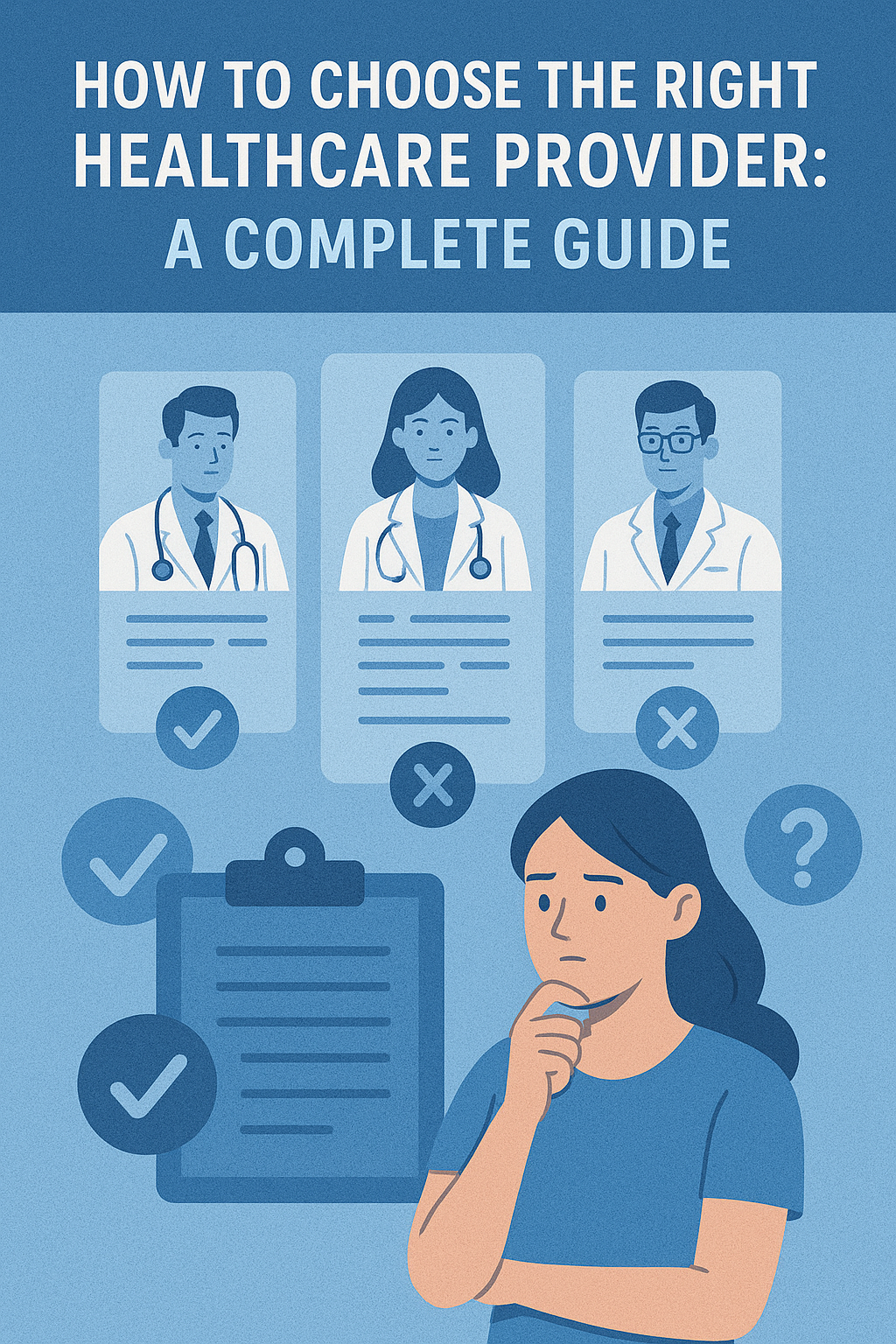Introduction: The Importance of Choosing the Right Healthcare Provider
Choosing a healthcare provider is one of the most important decisions you will make for your well-being. Whether you need a primary care physician, a specialist, or a hospital, the quality of care you receive directly impacts your health.
With countless options available, finding the right healthcare provider can feel overwhelming. Should you prioritize experience, reviews, or location? What about insurance coverage and hospital affiliation? This guide will walk you through every factor you need to consider when selecting a provider, ensuring you make an informed decision that best suits your medical needs.
Understanding Different Types of Healthcare Providers
Healthcare providers come in various forms, each serving specific medical needs. Understanding the different types will help you narrow down your search.
Primary Care Physicians (PCPs)
PCPs serve as the first point of contact for non-emergency medical needs. They offer routine check-ups, preventive care, and manage chronic conditions.
Types of PCPs:
- Family Medicine Doctors: Treat patients of all ages.
- Internal Medicine Doctors: Focus on adults and complex diseases.
- Pediatricians: Specialize in children’s health.
- Geriatricians: Cater to elderly patients.
Specialists
If you have specific medical concerns, you may need a specialist. Some common types include:
- Cardiologists: Heart-related conditions.
- Dermatologists: Skin issues.
- Orthopedic Surgeons: Bone and joint problems.
- Endocrinologists: Hormonal and metabolic disorders.
Hospitals and Clinics
Choosing a hospital or clinic depends on your medical condition. Some factors to consider include quality ratings, services offered, and emergency care availability.
Key Factors to Consider When Choosing a Healthcare Provider
1. Credentials and Experience
A doctor’s education, board certification, and years of experience play a crucial role in their ability to provide high-quality care.
How to Check Credentials:
- Board Certification: Look for providers certified by recognized medical boards.
- Education and Training: Verify their medical school and residency details.
- Experience with Your Condition: If you have a specific condition, choose a provider with extensive experience in that area.
2. Insurance and Costs
Healthcare can be expensive, so it’s vital to choose a provider that accepts your insurance plan.
Questions to Ask:
- Is this provider in-network with my insurance?
- What are the estimated costs for consultations, tests, and treatments?
- Are payment plans or financial assistance options available?
3. Reputation and Patient Reviews
Checking a provider’s reputation can help you determine their quality of care.
Where to Find Reviews:
- Google Reviews & Healthgrades – Read real patient experiences.
- Hospital Rating Websites – Look at rankings and patient satisfaction scores.
- Word of Mouth – Ask family, friends, or coworkers for recommendations.
4. Communication and Bedside Manner
A great healthcare provider should be approachable, listen to your concerns, and explain medical conditions clearly.
What to Look For:
- Do they take the time to answer your questions?
- Are they patient and compassionate?
- Do they involve you in decision-making regarding your treatment?
5. Accessibility and Convenience
Your provider should be easy to reach for routine visits and emergencies.
Consider:
- Location: Is the office/hospital close to home or work?
- Office Hours: Do they offer evening or weekend appointments?
- Telemedicine Services: Do they provide virtual consultations?
6. Hospital Affiliation and Facilities
If your provider is affiliated with a hospital, ensure that it has good ratings and the necessary medical facilities for your treatment.
How to Find and Compare Healthcare Providers
1. Use Online Directories
Websites like Zocdoc, WebMD, and Healthgrades allow you to search for providers based on location, specialty, and patient ratings.
2. Check Your Insurance Network
Most insurance providers have a list of covered doctors and hospitals. Visit their website or call customer service to get details.
3. Schedule an Initial Consultation
A first visit allows you to assess the provider’s approach, communication style, and facility cleanliness.
4. Ask for Referrals
Your current doctor or friends might have excellent recommendations based on personal experiences.
Red Flags to Watch Out For
While researching healthcare providers, be aware of warning signs that may indicate poor-quality care.
- Negative Patient Reviews: Consistent complaints about misdiagnosis, rushed appointments, or unprofessional behavior.
- Poor Communication: If a provider avoids answering questions or seems dismissive.
- High Staff Turnover: Frequent changes in staff can indicate internal problems.
- Unhygienic Facilities: A poorly maintained clinic or hospital can be a health risk.
How to Switch Healthcare Providers
If you’re unsatisfied with your current provider, switching is a valid option.
Steps to Change Providers:
- Find a New Doctor – Research and choose a suitable alternative.
- Transfer Medical Records – Request copies of your records for continuity of care.
- Inform Your Insurance Provider – Ensure your new doctor is covered under your plan.
- Schedule an Initial Visit – Meet your new doctor and discuss your medical history.
